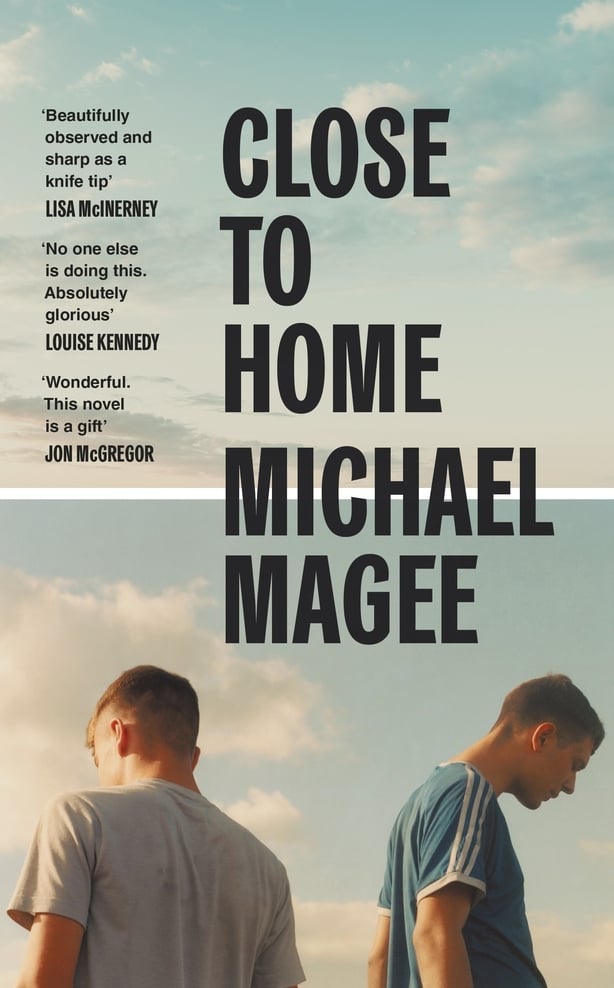'There was nothing to it. I swung and hit him and he dropped. A girl came flying forward and pushed me: What'd you do that for?’ It’s 2013 in working class West Belfast and Sean Maguire has returned home after finishing his English degree in Liverpool. At a house party, he loses control and assaults a ‘lad’. When the police arrive, they take his name and number. ‘I think it’s best you make your way home,' the ‘peeler’ says, and Sean finds himself in court soon after.
The officer’s words feel somehow prophetic. In the aftermath, Sean studies his knuckles as he sits in the damp, mouldy apartment he shares with childhood friend Ryan: ‘not having to pay rent was a dream’, but there’s no heat in the radiators, no hot water, and the bankrupt landlord has done a runner to Spain, ‘leaving a load of properties to be repossessed.’
'I need to get out of this,' Sean thinks to himself, without really knowing what 'this’ is.
Close to Home, the semi-autobiographical debut novel by writer Michael Magee, paints a compassionate and vulnerable picture of a generation living in the aftermath of the financial crash and in the long shadow of the Troubles, under a Good Friday Agreement that was supposed to bring a new beginning but which left many behind.
We need your consent to load this rte-player contentWe use rte-player to manage extra content that can set cookies on your device and collect data about your activity. Please review their details and accept them to load the content.Manage Preferences
Listen: Close To Home author Michael Magee talks to Brendan O'Connor
Magee is the fiction editor of literary magazine The Tangerine and a graduate of the PhD Creative Writing programme at Queen's University, Belfast. His writing has appeared in Winter Papers, The Stinging Fly, The Lifeboat and in The 32: An Anthology of Working Class Writing. Mirroring Magee’s own experience of rejection after submitting his first story to The Stinging Fly in 2013, protagonist Sean has his first story rejected, too. Magee’s connection and familiarity with the story gives it a strong sense of place and community.
Sean is the first in his family to go to college. But now that he’s back home, with a degree that’s ‘no use at all’, he’s working in a nightclub with Ryan and is pulled back into old habits. He’s ’padding himself with vodka’ and ‘tooting keys in cubicles’, taking gear that ‘makes you blame yourself for everything that’s gone wrong with your life.’ To get by, they trick the self check-out at the supermarket and swipe half-finished pints and dregs left behind by other punters in pubs. A lot of their friends have gone off to Australia or England in search of something better: a familiar experience for many young people after 2008.
As Sean works to come to term with his actions and the experiences that have shaped him, it’s childhood friend and ex-girlfriend Mairéad Riley who is a bright light for him in an uncertain world. An aspiring writer with a plan to move to Berlin, she introduces him to her crowd of literary friends from Queen’s and the life he could be leading. But he struggles to find comfort amongst people who ‘talk shite for the sake of talking shite’ and say ‘Northern Ireland' instead of the ‘North’, but who also embody his love of literature and writing. In that sense, Close to Home is a story about wanting to escape where you came from without betraying those you love.

Sean's mother cleans houses and struggles to make ends meet, but finds freedom in painting, while his half-brother Anthony, 'a hard man’, is fighting addiction. Sean hasn’t talked to or seen his father in years, but feels compelled to watch over his half-sister from a distance. ‘You hear anything about your man?’ Ryan asks Sean after the assault. ‘He wasn’t a man. He was our age,’ he replies. ‘We’re twenty-two, Sean. We’re men,’ Ryan replies, but that word doesn’t feel right to Sean, who feels split between what he wants, what he thinks he deserves and what he feels at home in.
From the apartment, ‘the mountain’ (Black Mountain) looms over the city: ‘you can’t miss the mountain. It’s everywhere you go, every street and road in West Belfast, you can’t get away from it. Whoever’s writing those messages up there knows fine rightly as well, the couldn’t have picked a better spot.’ But on the day Sean is forced to leave the apartment and move into his ma’s, the clouds are so low he can’t read the message.
It’s hard to find fault with a debut novel that unfold its storylines and characters with such care, handling themes of class, masculinity, addiction and trauma with both tenderness and a matter-of-factness.
Close to Home is published by Hamish Hamilton


